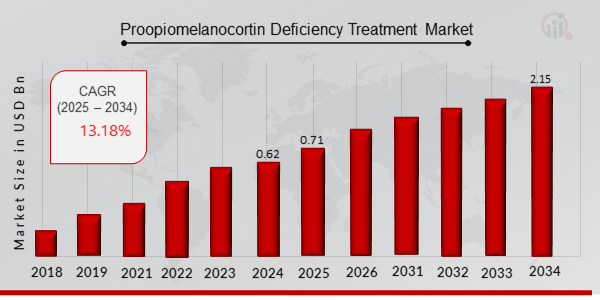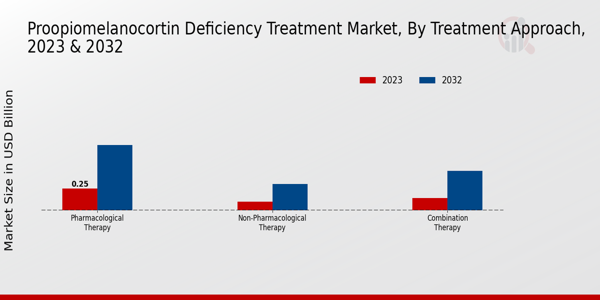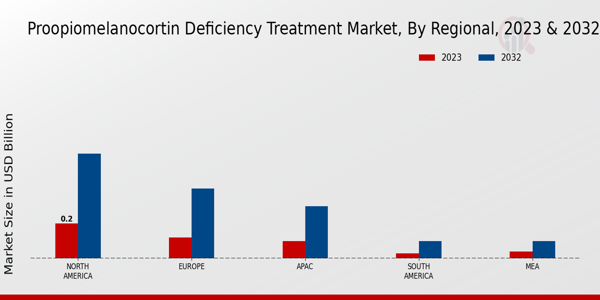Proopiomelanocortin Deficiency Treatment Market Overview
As per MRFR analysis, the Proopiomelanocortin Deficiency Treatment Market Size was estimated at 0.62 (USD Billion) in 2024. The Proopiomelanocortin Deficiency Treatment Market Industry is expected to grow from 0.71 (USD Billion) in 2025 to 2.15 (USD Billion) till 2034, at a CAGR (growth rate) is expected to be around 13.18% during the forecast period (2025 - 2034).
Key Proopiomelanocortin Deficiency Treatment Market Trends Highlighted
The Proopiomelanocortin Deficiency Treatment Market is witnessing dynamic expansion due to increased understanding of certain complex metabolic diseases in the population as well as the rise in obesity-related tertiary conditions. This demand is also fueled by the increase in diagnostic capabilities and the new therapies available for POMC deficiency. Coupled with that, there is a rise in demand for the provision of individualized patients, and therefore, encourages the development of medicines that meet specific patient needs. As the research increases understanding of the intricacy of this deficiency, there is increased development of new therapies, which are increasing the market further.
There is a trend that is gaining speed towards the harnessing of gene therapy and other new chemical entities, which may provide better management of conditions associated with Proopiomelanocortin. The heightened active participation of biotechnological companies in research and developmental activities also promotes competition that may yield new alternative treatment therapies.
The proliferation of telehealth systems and remote health applications is also changing the provision of care to patients in terms of access and the degree of support experienced by patients. This evolution is likely to improve patient activation and adherence to therapy, which, in the end, will affect treatment. The stage is set for the identification of such opportunities as the synergistic interaction of a pharmaceutical company and a research entity aimed at the development of innovative therapies.
Furthermore, the focus on expanding awareness campaigns is crucial for improving diagnosis rates and treatment access. As stakeholders recognize the need for comprehensive care strategies, there is an opportunity to create supportive networks for patients and healthcare providers alike. Emphasizing patient-centered care within this context can lead to improved outcomes and a more robust market presence.

Source: Primary Research, Secondary Research, MRFR Database and Analyst Review
Proopiomelanocortin Deficiency Treatment Market Drivers
Increasing Awareness of Proopiomelanocortin Deficiency
The Proopiomelanocortin Deficiency Treatment Market Industry is experiencing significant growth due to increasing awareness about proopiomelanocortin deficiency among healthcare professionals and the general population. As more information becomes available regarding the causes and effects of this condition, healthcare providers are better equipped to diagnose patients accurately and provide timely treatment options. This rise in knowledge is spurring interest in research and development focused on innovative therapies for this deficiency, which in turn drives the market forward.Furthermore, patient advocacy groups and organizations are playing a crucial role in amplifying awareness, ensuring that individuals suffering from this deficiency understand their condition and the treatment options available to them. This educational push is not only fostering a greater understanding of proopiomelanocortin deficiency but also encouraging policy changes that favor financial support for research and treatment initiatives. As a result, the market is poised for growth as the need for effective treatment solutions continues to be underscored.The intertwining of public health initiatives with market dynamics will further contribute to an increase in patients seeking treatment, thereby fueling demand in the Proopiomelanocortin Deficiency Treatment Market Industry.
Advancements in Treatment Options
The Proopiomelanocortin Deficiency Treatment Market Industry is benefiting from rapid advancements in treatment methodologies and technologies. As researchers and biopharmaceutical companies make strides in understanding the metabolic pathways associated with proopiomelanocortin, new and effective therapies are being developed. Innovative drug formulations and delivery systems are enhancing the efficacy of existing treatments and paving the way for personalized medicine tailored specifically to the genetic profiles of patients.With ongoing clinical trials demonstrating promising results, there is a palpable increase in the hope for improved outcomes, pushing healthcare providers to adopt these new therapies, thereby driving market growth.
Rising Healthcare Expenditures
The continuous rise in healthcare expenditures globally is propelling the Proopiomelanocortin Deficiency Treatment Market Industry forward. As countries prioritize healthcare access and affordability, investments in research, development, and distribution of treatments are increasing. The growing focus on rare diseases and disorders underlines the need for specialized treatments. As healthcare systems become more sophisticated, there is an increasing commitment to ensuring that patients have access to the best available treatment options.This ongoing trend of rising healthcare budgets allows for better resource allocation for tackling conditions such as proopiomelanocortin deficiency, thus fostering market expansion.
Proopiomelanocortin Deficiency Treatment Market Segment Insights
Proopiomelanocortin Deficiency Treatment Market Treatment Approach Insights
The Proopiomelanocortin Deficiency Treatment Market focuses significantly on the Treatment Approach, which encompasses various methodologies aimed at addressing this deficiency. In 2023, the overall market was valued at 0.49 billion USD, reflecting a growing interest in tailored treatment strategies to improve patient outcomes.
Within this landscape, the predominant approach is Pharmacological Therapy, valued at 0.25 billion USD in 2023 and projected to rise to 0.75 billion USD by 2032. This growth is propelled by advances in medication that target hormonal imbalances associated with Proopiomelanocortin Deficiency, showcasing its critical role in therapeutic interventions and establishing a majority holding in the treatment spectrum.
Non-Pharmacological Therapy holds a smaller but essential part of this market, valued at 0.1 billion USD in 2023, with expectations of reaching 0.3 billion USD by 2032. Such approaches often include lifestyle modifications and dietary interventions aimed at managing symptoms, thus playing a vital complement to Pharmacological Therapy. The increasing awareness and incorporation of holistic methods into treatment plans make this segment significant, even though it is not as dominant as Pharmacological Therapy.
Combination Therapy emerges as another valuable approach, valued at 0.14 billion USD in 2023 and projected to grow to 0.45 billion USD by 2032. This method integrates both pharmacological and non-pharmacological techniques, offering a comprehensive treatment option that addresses multiple aspects of Proopiomelanocortin Deficiency. Its importance is underscored as it provides tailored solutions for patients, ensuring they receive the best of both worlds in managing their condition. The rising prevalence of this deficiency, coupled with a strong push for personalized medicine, creates opportunities for the Combination Therapy segment to flourish.
Overall, the Treatment Approach within the Proopiomelanocortin Deficiency Treatment Market shows dynamic growth potential, driven by innovations in Pharmacological Therapy while highlighting the complementary roles of Non-Pharmacological and Combination Therapies.
As the market develops, stakeholders must navigate the challenges of treatment accessibility and patient adherence, recognizing that a well-rounded approach can significantly enhance the management of this condition and contribute to the overall market growth.

Source: Primary Research, Secondary Research, MRFR Database and Analyst Review
Proopiomelanocortin Deficiency Treatment Market Administration Route Insights
The Proopiomelanocortin Deficiency Treatment Market focused on the Administration Route, has been gaining attention due to its projected market value of 0.49 Billion USD in 2023, with a significant growth trajectory expected. Various administrative methods, such as Oral thrush, Injectable, and Intranasal routes, characterize the market. Among these, the Injectable method often stands out for its rapid delivery and efficacy, making it a preferred choice in various clinical settings. This method has become increasingly vital due to its convenience and effectiveness, contributing to a sizable portion of the Proopiomelanocortin Deficiency Treatment Market revenue.Meanwhile, Oral administration remains an essential route, as it offers ease of use, patient compliance, and broad acceptance, catering to those who prefer self-administration in a less clinical setting. The Intranasal route, although less common, is gaining traction for its quick absorption and minimal side effects. Overall, the diversity within the Proopiomelanocortin Deficiency Treatment Market segmentation reflects a growing recognition of varied patient needs, aiming to enhance treatment adherence and efficacy in managing this deficiency.
Proopiomelanocortin Deficiency Treatment Market Patient Type Insights
The Proopiomelanocortin Deficiency Treatment Market is making significant strides, particularly within the Patient Type segment, encompassing Children, Adults, and Geriatrics. As of 2023, the market is valued at 0.49 USD Billion and shows strong revenue growth potential driven by an increasing number of diagnosed cases and rising awareness of treatment options. The segment for Children is especially crucial, as early diagnosis and intervention can lead to improved health outcomes, making this demographic a priority for healthcare providers.Adults also represent a significant share of the market, with a growing focus on managing chronic symptoms associated with Proopiomelanocortin deficiency, thereby driving treatment innovation. The Geriatric population is notably becoming an essential part of the market growth narrative since age-related metabolic issues can exacerbate the condition, necessitating targeted therapies. Overall, the Proopiomelanocortin Deficiency Treatment Market segmentation reflects varied needs across age groups, where each category plays a vital role in addressing the multifaceted challenges posed by this condition, thus presenting both opportunities and challenges for the industry.The steady growth in the market is further supported by evolving healthcare policies and advancements in treatment methodologies, contributing to a comprehensive understanding of Proopiomelanocortin Deficiency Treatment Market statistics and trends.
Proopiomelanocortin Deficiency Treatment Market Indication Insights
The Proopiomelanocortin Deficiency Treatment Market, valued at 0.49 USD Billion in 2023, is poised for significant expansion due to the rising prevalence of associated health conditions. Within this market, the indications of Obesity, Adrenal Insufficiency, and Metabolic Disorders have gained considerable attention. Obesity stands as a major concern globally, driving demand for targeted treatments that address its biochemical underpinnings. Adrenal Insufficiency also represents a critical area, as the need for effective management strategies continues to grow alongside increasing awareness of related health risks.Moreover, Metabolic Disorders are garnering focus due to their complex health implications, leading to innovations in therapeutic approaches. The projected market growth highlights the promising opportunities for stakeholders to address these conditions, supported by emerging research and tailored treatment solutions.
The Proopiomelanocortin Deficiency Treatment Market segmentation shows that these indications will play a pivotal role in shaping the industry's future landscape. As research and development focus on these conditions, the market's ability to meet evolving healthcare needs will be crucial in the coming years, reflecting the broader trends within the healthcare industry.
Proopiomelanocortin Deficiency Treatment Market Regional Insights
The Proopiomelanocortin Deficiency Treatment Market is poised for significant growth across various regions, with an overall valuation reaching 0.49 USD Billion in 2023 and anticipated to rise to 1.5 USD Billion by 2032.
In North America, the market was valued at 0.2 USD Billion in 2023, making it a major player and reflecting the region's robust healthcare infrastructure and awareness surrounding rare diseases. Europe follows closely with a market valuation of 0.12 USD Billion in 2023, showcasing a significant opportunity for growth driven by advanced research initiatives.The APAC region, initially valued at 0.1 USD Billion, highlights emerging markets' increasing investments in healthcare, while South America and MEA, valued at 0.03 USD Billion and 0.04 USD Billion, respectively, signify smaller but important segments benefiting from growing awareness and healthcare access.
Overall, the North American region dominates the Proopiomelanocortin Deficiency Treatment Market due to higher prevalence reporting and funding for research, while Europe and APAC present substantial opportunities driven by increased research and healthcare developments.

Source: Primary Research, Secondary Research, MRFR Database and Analyst Review
Proopiomelanocortin Deficiency Treatment Market Key Players and Competitive Insights
The competitive insights of the Proopiomelanocortin Deficiency Treatment Market reveal a dynamic landscape influenced by various factors, including research advancements, product availability, and regulatory developments. Organizations engaged in this niche therapy area are constantly innovating and adapting their strategies to maintain a competitive edge. This market is characterized by a strong focus on developing effective treatments for the underlying hormonal imbalances caused by proopiomelanocortin deficiency.
As awareness of this deficiency grows, the competition intensifies, leading to increased investments in product development and marketing strategies. Moreover, companies are forging collaborations and partnerships to leverage expertise, enhance distribution networks, and accelerate research and clinical trials, which in turn contributes to the expanding array of treatment options for patients.Pfizer has established a notable presence in the Proopiomelanocortin Deficiency Treatment Market, leveraging its vast experience and robust resources. The company benefits from a well-rounded portfolio of therapeutic solutions that are reliable and demonstrated in efficacy, which strengthens its market position considerably. Pfizer's commitment to research and development is also a key strength, as it enables the company to pioneer innovative treatments that address unmet needs in POMC deficiency. Its global reach ensures the availability of its products across diverse markets, while its established reputation adds a layer of trust among healthcare providers and patients alike. This strategic commitment not only amplifies Pfizer's impact in the treatment market but also solidifies its role as a pivotal player in advancing healthcare solutions for individuals facing this deficiency.Amgen has carved out a significant stake in the Proopiomelanocortin Deficiency Treatment Market through its focus on biotechnology-driven innovations. This company's robust pipeline is indicative of its long-standing commitment to addressing complex health issues, with a particular emphasis on precision medicine that could potentially benefit patients suffering from POMC deficiency. Amgen's research initiatives are backed by significant investments, ensuring continued development in treatment modalities tailored for this condition. Furthermore, the collaboration with academic and research institutions enhances its ability to expedite clinical trials and bring new therapies to the market efficiently. The combination of scientific expertise and operational capabilities positions Amgen as a formidable contender in the competitive landscape of Proopiomelanocortin deficiency treatment, positioning it for sustainable growth in the evolving market.
Key Companies in the Proopiomelanocortin Deficiency Treatment Market Include
Proopiomelanocortin Deficiency Treatment Market Industry Developments
The Proopiomelanocortin Deficiency Treatment Market has seen notable developments recently. Pfizer and Amgen are actively involved in ongoing research and development for innovative treatments targeting this condition. Both companies are emphasizing biological therapies, which are gaining traction due to their efficacy in addressing the underlying mechanisms of proopiomelanocortin deficiency. Takeda and Genentech are also exploring novel delivery methods to improve patient outcomes and adherence. Additionally, Eli Lilly and Teva Pharmaceuticals are examining combination therapies to enhance treatment effectiveness.In terms of mergers and acquisitions, Novartis recently announced its interest in acquiring smaller biotech firms focused on rare disease treatments, which could strengthen its portfolio in this niche market. The growth in market valuation for companies like Ipsen and Vertex Pharmaceuticals reflects increased investment in clinical trials and partnerships aimed at advancing treatment options. This influx of capital and research activity is expected to drive innovation and potentially expand access to therapies for those affected by POMC deficiency. Overall, the competitive landscape continues to evolve rapidly, promoting collaboration among key players while enhancing the overall market dynamics.
Proopiomelanocortin Deficiency Treatment Market Segmentation Insights
-
Proopiomelanocortin Deficiency Treatment Market Treatment Approach Outlook
- Non-Pharmacological Therapy
-
Proopiomelanocortin Deficiency Treatment Market Administration Route Outlook
-
Proopiomelanocortin Deficiency Treatment Market Patient Type Outlook
-
Proopiomelanocortin Deficiency Treatment Market Indication Outlook
-
Proopiomelanocortin Deficiency Treatment Market Regional Outlook
| Report Attribute/Metric |
Details |
|
Market Size 2024
|
0.62 (USD Billion)
|
|
Market Size 2025
|
0.71 (USD Billion)
|
|
Market Size 2034
|
2.15 (USD Billion)
|
|
Compound Annual Growth Rate (CAGR)
|
13.18 % (2025 - 2034)
|
|
Report Coverage
|
Revenue Forecast, Competitive Landscape, Growth Factors, and Trends
|
|
Base Year
|
2024
|
|
Market Forecast Period
|
2025 - 2034
|
|
Historical Data
|
2020 - 2024
|
| Market Forecast Units |
USD Billion |
| Key Companies Profiled |
Pfizer, Amgen, Takeda, Genentech, Eli Lilly, Teva Pharmaceuticals, Ipsen, Vertex Pharmaceuticals, GlaxoSmithKline, Boehringer Ingelheim, Adecco, Novartis, Sanofi |
| Segments Covered |
Treatment Approach, Administration Route, Patient Type, Indication, Regional |
| Key Market Opportunities |
Rising awareness of hormonal disorders, Growing demand for personalized therapies, Advances in genetic research technologies, Increased funding for rare diseases, Expanding patient support networks |
| Key Market Dynamics |
Increasing prevalence of hormonal disorders, Rising demand for targeted therapies, Advancements in genetic research, Growing awareness among healthcare providers, Strong pipeline of innovative treatments |
| Countries Covered |
North America, Europe, APAC, South America, MEA |
Frequently Asked Questions (FAQ) :
The expected market size of the Proopiomelanocortin Deficiency Treatment Market in 2034 is 1.5 USD Billion.
The projected CAGR for the Proopiomelanocortin Deficiency Treatment Market from 2025 to 2034 is 13.18%.
North America is expected to have the largest market value of 0.6 USD Billion in 2034 for the Proopiomelanocortin Deficiency Treatment Market.
The market size of the Pharmacological Therapy segment is expected to reach 0.75 USD Billion in 2034.
Key players in the Proopiomelanocortin Deficiency Treatment Market include Pfizer, Amgen, Takeda, and Eli Lilly.
The market value for Non-Pharmacological Therapy is expected to be 0.3 USD Billion in 2034.
The expected market growth for the APAC region is projected to reach 0.3 USD Billion by 2034.
The forecasted market size for Combination Therapy is anticipated to be 0.45 USD Billion in 2034.
The Proopiomelanocortin Deficiency Treatment Market is currently facing challenges related to regulatory hurdles and drug approval processes.
Emerging trends such as increased awareness and research on proopiomelanocortin deficiency are influencing the growth of the market.

















